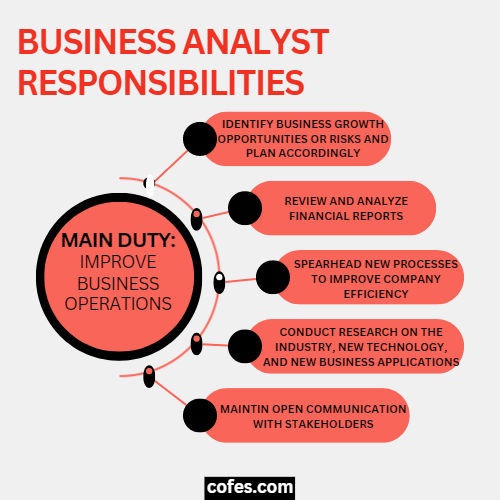Business Analysts: The Decoders of The Business World
Business analysts are the interpreters of an organization.
They take in complex information and reports and translate them to others within a company.
They find ways to improve systems to make a business thrive.
Although a large portion of their job is independent and analytical, they still work with others and present information to large groups, whether it’s a new strategy that will take the business to the next level or training existing employees on new procedures and protocols.
This job is flexible enough to work remotely while still enjoying doing the things you love, like travel.
Business Analyst Information
| Official Job Title | Business Analyst |
| Average Salary | $90,002 |
| Stress Level | High |
| Work/Life | Average |
| Job Satisfaction | Average |
| Career Advancement | Above Average |
Business Analyst Job Description
What Is A Business Analyst?
Business analysts work with organizations to improve their processes and systems.
They create and implement strategies that will make the company more successful.
They oversee the training and development of those systems.
They are also responsible for giving data-driven recommendations to executives and stakeholders to make business decisions.
Business analysts must be experts on how a business operates and generates revenues.
They find growth opportunities and identify potential threats and plan accordingly.

What Does a Business Analyst Do On A Daily Basis?
Daily, business analysts review financial reports and analyze critical growth opportunities.
They could also be leading or overseeing the training of a new procedure that will improve efficiency across the company.
Afterward, they could be preparing for a meeting with senior leadership to discuss emerging problems and solutions that minimize the risk of that happening.
They then will typically spend the rest of their time researching what is happening within their industry, what new strategies and technologies are working well for others, and if that may be beneficial for the company to adopt.
Responsibilities, Duties & Roles of a Business Analyst
An overview of the roles and responsibilities of a business analyst include:
- Identify trends and problems that could be detrimental to the business
- Create and implement systems that will help the company thrive
- Create detailed business reports outlining issues and opportunities to present to senior leadership and stakeholders
- Analyze business structures for chances to improve efficiency and effectiveness
- Report new ideas to stakeholders and take feedback into consideration
- Oversee the training and development of new procedures
- Conduct extensive research about emerging strategies that could be beneficial to adopt
- Test and re-evaluate the effectiveness of old processes and protocols
- Estimate business costs and opportunities to save money.
Business Analyst Salary
Average Salary
According to Talent.com, the average salary for a business analyst in the US is $90,002.
Starting Salary
According to Talent.com, the starting salary for a business analyst in the US is $71,649.
Senior Salary
According to Talent.com, the senior salary for a business analyst in the US is $122,582.
How To Become A Business Analyst
The Entry Level: Certification, Training & Degree
The first step in becoming a business analyst is to earn an undergraduate degree in business.
It is important to remember that while you are earning your degree, you should also be educating yourself in the technical skills you will need to be successful such as computer skills, risk management software, and public speaking.
A popular certification pursued by aspiring business analysts is the International Institute of Business Analysis (IIBA) certification.
The great thing about this certification is that it is recognized globally, making international job opportunities more attainable.
Other Skill Sets, Requirements & Qualifications
A skill set that is critical to business analysts is a growth mindset.
In this career, you must be learning continuously to maintain a competitive edge within your industry.
There are always new skills to learn and software to explore.
The ability to thrive under pressure and meet deadlines is critical.
Soft skills such as emotional intelligence, problem-solving skills, and working well with others are often required.
Although a large portion of your work will be independent, you will still need to work with other employees occasionally and present ideas to senior management and stakeholders.
How Long Does It Take To Become A Business Analyst?
Historically, it takes four years to become a business analyst; however, formal education is changing.
Some employers accept online certifications and diplomas that take only 3-4 months to complete.
Applicants may need to have proof of intellectual ability before receiving a job offer.
Is it Hard To Become a Business Analyst?
Becoming a business analyst is challenging.
Often aspiring business analysts need to take additional mathematical courses outside of their undergraduate studies to become top performers.
Even after graduation, the learning never stops.
Businesses are constantly changing, and business analysts need to adapt to competitive and challenging environments.
Business Analyst Career Paths
The Business Analyst RoadMap
Before beginning your career as a business analyst, you must first pursue formal education, such as earning an undergraduate degree in business, typically majoring in finance, accounting, or management.
It is uncommon to step into a business analyst role upon graduation.
It is more common to start in an entry-level position, such as a quality assurance coordinator or a junior systems specialist, before securing a job as a business analyst.
Projections For Growth In Business Analysis Jobs
According to the U.S. Bureau of Labor and Statistics (BLS), business analysts’ jobs are projected to grow 9% in the next ten years, which is faster than average.
In Summary: Is Business Analysis a Good Career?
Yes.
Business analysis is an excellent career for someone who enjoys critical thinking and is looking to be a lifelong learner who challenges themselves regularly.
It can also be gratifying to know that the position you hold is valuable and you directly impact the organization.
While the hours can be hectic later on in your career, they can also be more exciting.
Business analysts also can work remotely, making it an appealing option for those looking to live a nomadic lifestyle.
Working Conditions
Can A Business Analyst Work Remotely From Home?
Business analysts can most certainly work from home due to the nature of the work.
Several meetings can be hosted virtually using Zoom or Skype.
How Many Hours Does A Business Analyst work?
Most Business Analysts work 40 hours a week and sometimes even more, according to the U.S. Bureau of Labor and Statistics (BLS).
Can A Business Analyst Work Part-Time?
It is possible to work part-time for smaller companies.
However, business analysts need to work full-time in larger organizations as the business world is constantly changing.
What Are The Average Vacation Days Of A Business Analyst?
According to Indeed, the average number of vacation days among employees in the US is 11 days.
Several companies reward long-term employees with additional vacation days and flexibility.

Alternative Careers & Similar Jobs to a Business Analyst
- Budget Analyst
- Operations Analyst
- Data Analyst
- Sales Analyst
- Financial Analyst
- Market Research Analyst
- Business Development Manager
- Auditor
- Finance Manager
Business Analyst Resume Tips
Your resume should be straightforward, comprehensive, and engaging.
It is essential to highlight your achievements, such as certifications, and technical abilities, such as public speaking.
At times, providing links to presentations or speeches you’ve given in the past can set you apart from other candidates.
Business Analyst Interview Questions
Q1: Can you explain your typical project approach?
Why it works: You will be asked to prove that you are competent and have a strong understanding of the business analysis planning process.
Q2: How do you handle difficult stakeholders?
Why it works: Hiring managers need you to convince them that aside from analytical expertise, you can communicate in a way that can diffuse tense situations you may find yourself in.
Q3: Why are flow charts important?
Why it works: You need to explain that it is a helpful tool for explaining complex concepts to non-technical employees within the organization.
Jobs Related To Business Analysts
- Product Manager
- Business Process Analyst
- Compliance Manager
- Business Architect
- IT Business Analyst
- Chief Information Officer
- Systems Architect
For HR Manager: Tips For Hiring A Business Analyst
Key Characteristics to Look For In Hiring A Business Analyst
- Attention To Detail: There is little to no room for error in this job, and misrepresenting information can lead to an organization losing a significant amount of money.
- Strong Written & Communication Skills: Business analysts often need to take complex information and explain it to senior management and stakeholders in an easy-to-understand and compelling way.
- Presentation Skills: A candidate that can present ideas clearly and confidently to executives and stakeholders is invaluable to a company.
- Ability To Work Well With Others: Although a large portion of this position is performed independently, business analysts occasionally collaborate with other employees. Strong interpersonal skills are fundamental to building strong work relationships and promoting a positive work culture.
Minimum Level Of Education & Experience
It typically takes four years to become a business analyst.
However, job requirements are changing.
Some employers accept online certifications and diplomas that take only 3-4 months to complete.
Read More
- Dietitian: Job Description, Salary, Duties & More
- Neuroscientist: Job Description, Salary, Duties & More
- Paralegal: Job Description, Salary, Duties & More
- Security Manager: Job Description, Salary, Duties & More
- Product Manager: Job Description, Salary, Duties & More
